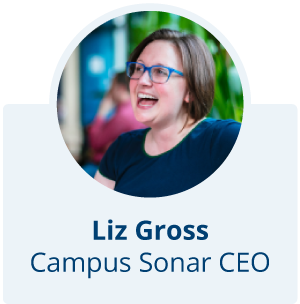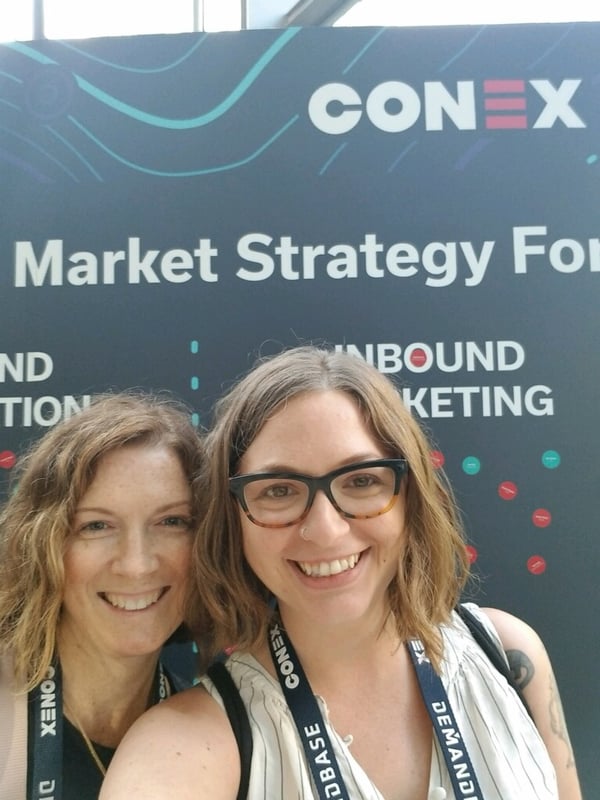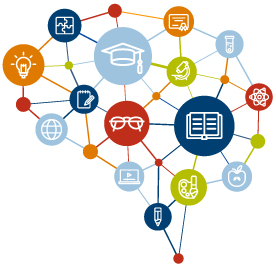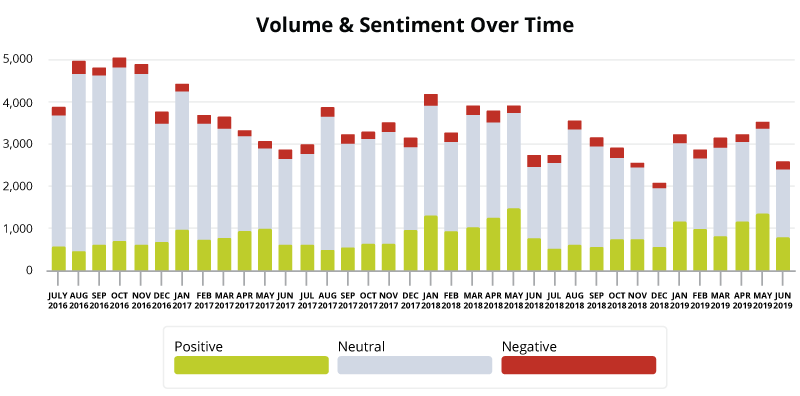Liz's Letter

Higher education has a lot of challenges: price, value, reputation, retention, funding, competition, demographics, etc. Rather than let ourselves be overwhelmed by doomsday scenarios, we can roll up our sleeves and start to do things differently. You may think spending every day mired in the online conversation about higher education would turn me and the Sonarians into jaded, pessimistic pundits. You'd be wrong. After reviewing analyses of online conversation about the industry at large, specific campuses, executive leadership, and students and families navigating the enrollment journey, I see opportunity and possibility.
With over half of word-of-mouth conversation occurring online, we have access to the largest searchable archive of human thought; an always-on focus group that we can ask any question, any time. When campuses, professional associations, public/private partners, and trade groups tap into the power of ongoing audience intelligence, our service offerings and constituent relationships will be forever changed for the better. By better understanding what people say about us (and what we say about ourselves) we’ll increase trust and drive strategic outcomes. The cost of not using this intelligence would cause us to become tone-deaf, out-of-touch, or blind to opportunity sitting right in front of our eyes—ultimately harming both reputation and revenue generation for institutions.
As higher education commits to finding and analyzing online conversations that matter, the expressed and implied needs of consumers will inform both academic programs and nontraditional delivery methods. Campus leaders will cease to wonder “what do our constituents think?” because they’ll have strategies in place to take the pulse of those constituents regularly. Students and their families who turn to the internet and their peers for advice will receive it alongside qualified, trusted counsel from the academe where and when they need it. Institutions will measure and improve their brand value and influence not by gut feelings, but by analysis of alignment between conversations they own and conversations they earn. We'll evolve and improve institutions of higher education with our audience, not strictly for their tuition dollars.
I believe social listening and online conversation data is a crucial component of an institution’s analytics strategy, and I agree with AIR, EDUCAUSE, and NACUBO that “analytics can save higher education.” Whether your motivation is opportunity, innovation, or fear of being left behind, recognizing data from within your institution and from your key audiences as a strategic asset unlocks doors you didn’t even realize were closed. This is what gets me out of bed every day, and what Campus Sonar is committed to providing for our industry.
Let’s get to work.

A Sonarian Content Experience
 Michelle and I headed up north last month to attend Conex in Toronto, and I've been ruminating on some thoughts from the conference ever since. First off, it reminded me that—brace yourself, folks—marketing is hard! There are so many components to what we do day in and day out. We spent three days at Conex talking only about content marketing (and could have spent even longer on it). Marketing has to keep up with trends, requests we make, requests we receive, content, design, events, PR, perception, social … the list goes on. So I want to take a moment to give a huge shout-out to all of our marketing friends reading this. I see you. I feel you. I send you caffeinated thoughts.
Michelle and I headed up north last month to attend Conex in Toronto, and I've been ruminating on some thoughts from the conference ever since. First off, it reminded me that—brace yourself, folks—marketing is hard! There are so many components to what we do day in and day out. We spent three days at Conex talking only about content marketing (and could have spent even longer on it). Marketing has to keep up with trends, requests we make, requests we receive, content, design, events, PR, perception, social … the list goes on. So I want to take a moment to give a huge shout-out to all of our marketing friends reading this. I see you. I feel you. I send you caffeinated thoughts.
 It was great to be surrounded by like-minded folks at Conex, spending time thinking and talking about how we can do content marketing well. There are nuances. The rules change a lot. But at the end of the day, it's what draws you, dear reader, to us—which is truly a privilege. And that's always a worthwhile reminder.
It was great to be surrounded by like-minded folks at Conex, spending time thinking and talking about how we can do content marketing well. There are nuances. The rules change a lot. But at the end of the day, it's what draws you, dear reader, to us—which is truly a privilege. And that's always a worthwhile reminder.
Here at Campus Sonar we try—we really do—to create content that matters to you in whatever pursuit you're on, but we know we can always do better. So the conference was a welcome energizer to try even harder to do just that. And if you ever come to us and end up wanting, I'd like to personally invite you to tell me. Shoot me a tweet, send an email, shout it from the rooftops. I'll be listening.
In the meantime, check out some of the great resources that resonated with us throughout the conference.
Sneak Peek: What We Are Learning about Admissions Conversation
 Campus Sonar is excited to announce a preview of a new report on the higher ed admissions funnel. Using a social listening approach, we gathered public online conversation from prospective and admitted students talking about the college admissions process over a three-year period (June 1, 2016 to July 30, 2019). We identified more than 124,000 mentions, as well as more than 26,000 unique online authors.
Campus Sonar is excited to announce a preview of a new report on the higher ed admissions funnel. Using a social listening approach, we gathered public online conversation from prospective and admitted students talking about the college admissions process over a three-year period (June 1, 2016 to July 30, 2019). We identified more than 124,000 mentions, as well as more than 26,000 unique online authors.
Our study will help you, as higher education professionals:
- Build a better understanding of the online conversation and behavior of admissions conversation.
- Connect and engage with your target audiences.
- Understand how sentiment and student perspectives change during different stages of the admissions process.
- Develop specific strategies to target student audiences and appeal to their interests during the admissions process.
We segmented the admissions conversation into specific categories.
- Admissions—prospective and admitted students.
- Athletics—conversation regarding collegiate athletics.
- Program type—undergraduate education (segmented by area of study) and graduate education (segmented by types of graduate program).
- Page type—including, but not limited to, Twitter, Instagram, and forums.
- Specific or non-specific—mentions of a particular institution or mentions about admissions in general terms.
- Inquiry—mentions that include a question, rather than a statement or opinion.
Key Takeaways
Mentions by Platform
- 86 percent Twitter, 11 percent forum (Reddit primarily), 3 percent Instagram, <1 percent news and blogs.
Twitter tends to be our largest data source; however, some of the most valuable insights come from Reddit. The trends include peer-to-peer admissions advice, including program recommendations, fears and anxieties about financial aid and student loans, application help, and evaluations of the likelihood of admission to certain institutions.
Overall Mention Sentiment
- 23 percent positive, 6 percent negative, 71 percent neutral.
This breakdown is similar to our expectations, given the positive nature of admitted student conversation. If we delve deeper into the breakdown, we can see that the positive mentions focus on sharing news of admissions and program decisions and the negative mentions are primarily prospective students demonstrating worry or anxiety for the future.
Specific vs. Non-specific Mentions
- Only 24 percent of mentions referenced one or multiple specific universities or institutions. However, this particular segment of university-specific mentions garnered 63 percent positive sentiment and only 2 percent negative sentiment.
The text of the conversations indicates that the majority of those who reference a particular institution only do so once they’ve been admitted, hence the positive trend. Mentions that don’t reference a particular institution make up only 10 percent positive sentiment and 7 percent negative; these mentions are much more broad and speculative, leaving much of the emotional inference in doubt.
Conversation Over Time
Mapping the nearly 125,000 total mentions over month-to-month paints a clear picture of the ebbs and flows of online conversation volume over time. We see recurring seasonal highs and lows in volume that coincide with a typical institution’s annual admissions cycle. The lowest volume is consistently during the summer months when school is not typically in session and when many prospective students have already made their admissions decisions.

Our admissions report will be out later this year. Sign up to be one of the first to receive it.
Key Social Listening Resources
 2019 Online Conversation Benchmarks for Higher Education—Research from Campus Sonar that provides you with data to define your online conversation, conversation volume, and branded content based on comparable institutions.
2019 Online Conversation Benchmarks for Higher Education—Research from Campus Sonar that provides you with data to define your online conversation, conversation volume, and branded content based on comparable institutions.
 Admissions Leadership Podcast—Ken Anselment has one-on-one conversations with people who are climbing the leadership mountain in college admissions.
Admissions Leadership Podcast—Ken Anselment has one-on-one conversations with people who are climbing the leadership mountain in college admissions.
 The Complete Guide to Reddit Data—A Brandwatch guide with practical tips to get the most out of Reddit, including use cases.
The Complete Guide to Reddit Data—A Brandwatch guide with practical tips to get the most out of Reddit, including use cases.
 Examining Twitter Influence of Campus Executives: A Campus Sonar Social Listening Report featuring Dr. Josie Ahlquist—Research from Campus Sonar and Dr. Josie Ahlquist that examines the online presence of higher education executives and provides an authoritative source to shape their digital presence. #InfluentialExecs
Examining Twitter Influence of Campus Executives: A Campus Sonar Social Listening Report featuring Dr. Josie Ahlquist—Research from Campus Sonar and Dr. Josie Ahlquist that examines the online presence of higher education executives and provides an authoritative source to shape their digital presence. #InfluentialExecs
 Getting Athletics off the Bench in Your Marketing—Athletics isn't as separate from an institution's goals and strategy as it may seem, Tim Jones from Beloit College explains.
Getting Athletics off the Bench in Your Marketing—Athletics isn't as separate from an institution's goals and strategy as it may seem, Tim Jones from Beloit College explains.
 What College Admissions Offices Really Want—In The New York Times, Paul Tough explores the complicated reality of college admissions.
What College Admissions Offices Really Want—In The New York Times, Paul Tough explores the complicated reality of college admissions.
Our Latest Blogs
Find our latest posts on the Brain Waves Blog.
See Campus Sonar
Stop and see us at an upcoming conference. We'd love to chat with you!
Tell Us What You Think
Brain Waves newsletter is for you—help us shape the news we share with you. Tell us what you think, send us suggestions, and let us know what would help you do your job better. We want to know! Send your feedback to info@campussonar.com.
Subscribe
Did someone forward you this email? Subscribe today.
